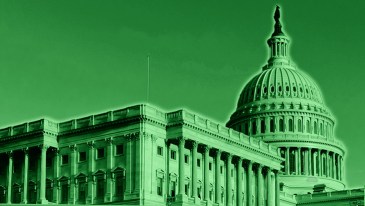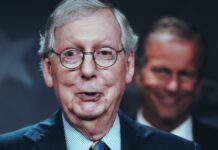The overwhelming majority of candidates seeking federal office refuse to publicly weigh in on the issue of marijuana legalization, according to an analysis provided by the Washington, DC think-tank, The Brookings Institute. Among the minority who do, those speaking out in favor of adult-use legalization are primarily Democrats while those opposing it tend to be Republicans.
Brookings researchers analyzed publicly stated views of over 2,300 candidates running in US Congressional primaries.
They reported, “The vast majority of candidates (81.4 percent) made no mention of cannabis reform at all on their websites and social media. In fact, clashing against the idea that the popularity of cannabis reform should be pushing legislators to make clear statements of support for reform, 86.4 percent of candidates either made no mention, staked out an unclear position, or explicitly opposed cannabis reform.”
NORML’s Deputy Director Paul Armentano responded: “Voters’ views on the subject of legalizing and regulating cannabis have evolved significantly over the past decades; however, the views of those seeking to represent them in Congress have not kept pace with this seismic shift in public opinion. Candidates’ failure to advocate for marijuana policy reform is a missed opportunity, as this is a unique issue that unites voters irrespective of party affiliation.”
According to nationwide polling data from Gallup and others, majorities of Democrats, Republicans, and Independents support legalizing marijuana for adults. Over 90 percent of Americans say that the use of cannabis for medical purposes ought to be legal.
Among those candidates with positions, support for cannabis law reform was strongly partisan – a finding that is consistent with prior analyses of elected officials. “A pro-cannabis reform position was much more popular among Democratic candidates (30.5 percent) than among Republican candidates (2.0 percent),” the report determined. “This demonstrates clear differences between the parties that are also reflected in rates of opposition to cannabis. Although more than 90 percent of Republican candidates failed to mention cannabis at all, 4.1 percent of them staked out an anti-cannabis reform position. On the other hand, only three of the 962 Democratic primary candidates (0.3 percent) opposed reform.”
Paradoxically, Republicans running for office in states with legal marijuana markets were less likely than candidates elsewhere to voice support for changes in cannabis laws.
The Brookings analysis concludes: “In sum, cannabis as a political issue has risen in importance over the past 25 years. As state legislatures and voters via referenda have enacted changes to cannabis laws, the issue has become more popular even in the halls of Congress. However, cannabis reform advocates’ frequent stupefaction at the lack of progress at the federal level bumps up against a stark reality. Most candidates for federal office do not see cannabis as an issue prominent enough to discuss, and deep partisan differences still remain among elected officials, even as support for cannabis in the general public has exploded in recent years. And the true motivator for a member of Congress to take or change a position – whether voters hold their feet to the fire over an issue – has not yet become a reality in the vast majority of Congressional races across the United States.”
Commenting on the study’s conclusions, NORML’s Political Director Morgan Fox said: “The underlying message of this study is clear. Voters must let their elected and prospective federal representatives know that this issue is important to them. Despite many of the cannabis policy reforms under consideration by Congress – such as the expungement of past convictions, permitting medical cannabis access for veterans, and allowing banks to work with licensed marijuana businesses – being highly popular issues among voters, such legislation continues to be a low priority for all but a few lawmakers. Voters across the country need to show lawmakers that they benefit from publicly supporting and prioritizing sensible cannabis policies, and that they will face political consequences for inaction or obstruction.”
Full text of the report, “Congressional candidates’ silence on cannabis reform,” is available from The Brookings Institute. Additional information on candidates and elected officials’ positions on cannabis policy is available from NORML’s voter guide, Smoke the Vote.















